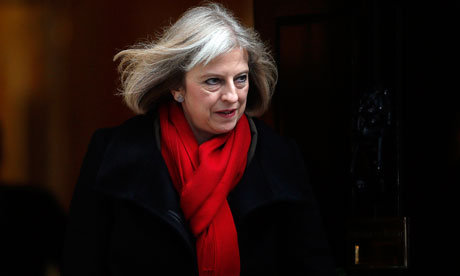If Britain has suddenly decided that open justice is a luxury we can't afford, then I for one was not invited to the debate

Britain's home secretary, Theresa May, leaves Downing Street in London. Photograph: Stefan Wermuth/Reuters
Last March, I watched from afar as perhaps the most important case in my 30-year legal career was decided in a soundproofed room protected by a security guard. This was the first time in the UK supreme court's history that it had entered closed session for what has been aptly named a "secret court". It is a phrase we should get used to after a judge ruled last week that the home secretary, Theresa May, has the power to "terminate" high court challenges on national security grounds and push more cases away from public view.
This ruling is all the more worrying after my experience. Giving his final judgment on our secret court, Lord Hope described it as an "unwelcome departure from the principle of open justice", calling for a "stern and steadfast resistance to the use of that procedure" in the future. His call is one that every Briton should heed.
Representing Bank Mellat, an Iranian bank caught up in the middle of the sanctions battle between the west and Iran, I was tasked with showing that UK sanctions must be more than an indiscriminate attack on people living under regimes we dislike. My firm argued that the Treasury had no evidence to suggest the bank had somehow helped Iran's nuclear programme. The sanctions were at best irrational and at worst discriminatory. The supreme court agreed – but there was a catch. In a last ditch attempt to win the day, the Treasury claimed that they did have rock solid evidence … they just couldn't show anyone.
The dilemma was etched on Lord Neuberger's face as he announced the decision to enter a secret court. On the one hand, the Treasury insisted that the evidence must be kept secret for national security reasons, but on the other the supreme court risked undermining the whole system of open justice. Imagine being convicted of a crime by evidence you are not allowed to see and without the opportunity to defend yourself – that is the state in which the bank found itself. When the Treasury insisted that the supreme court view evidence obtained from the secret services, the judges obliged in good faith. Ultimately, the court attached little weight to this evidence and decided in Bank Mellat's favour.
The judges' concern, much like my own, is that justice conducted behind closed doors with evidence hidden from view is no kind of justice at all.
The ultimate driving force behind this self-mutilation of a proud justice system was the politics of security. Ironically, it is in our dealings with the alleged opponents of liberty that the dangerous, prejudicial and irrational politics of security push us to our most extreme. Just as the US Prism programme is unravelling the extent to which we have given up our privacy to GCHQ, so too are secret courts forcing us to be "free" in ways we are powerless to stop.
You need only look to the US to see the sacrifices made in the name of national security – a compassionless system fuelled by uncompromising secret surveillance of citizens and allowing the unchecked detention of suspects in Guantánamo Bay. Has the balance in the name of security gone too far? In Bank Mellat's instance, our supreme court may have dismissed the government's tactics, but it would be naive to hope that nine judges will be enough to rein in sustained attacks on British liberty if the rot of politics continues to eat away at our rights. Only days after the supreme court entered closed session in the case I was representing, a broad coalition of Labour, Liberal Democrats and Conservative MPs pushed through the Justice and Security bill, allowing the same secret courts used against foreign companies to apply to anyone living in the UK. This bill has now come into full force. Indeed, as the revelations about GCHQ's snooping make clear, there will be no dearth of information available to help the secret courts convict us.
If the British people have suddenly decided that open justice is a luxury we cannot afford, then I for one was not invited to the debate. It is perfectly reasonable to argue that the threats facing the UK warrant such suspensions of justice, but it is both absurd and dangerous to allow this vital judgment call to be made solely by those politicians who hope to wield the new powers against us. Privileges which we can surely only give up voluntarily have been wrestled from us without our consent.
The revelations of secret courts and Prism show just how little influence we have over our own rights. Indeed as Theresa May can now attest, not even high court judges can keep the government's secret courts at bay. It is time politicians asked for our permission before denying us access to open justice.

No comments:
Post a Comment